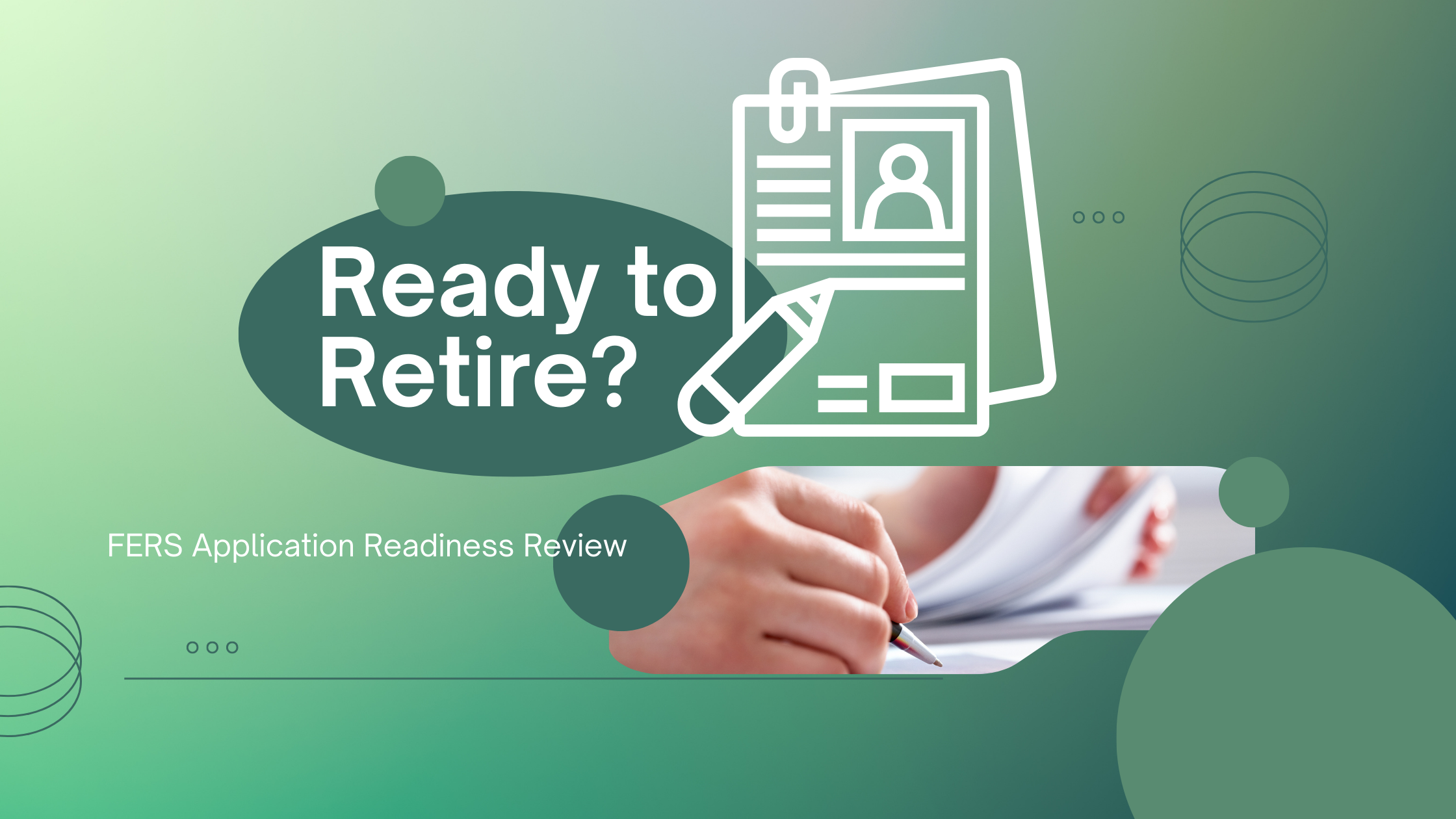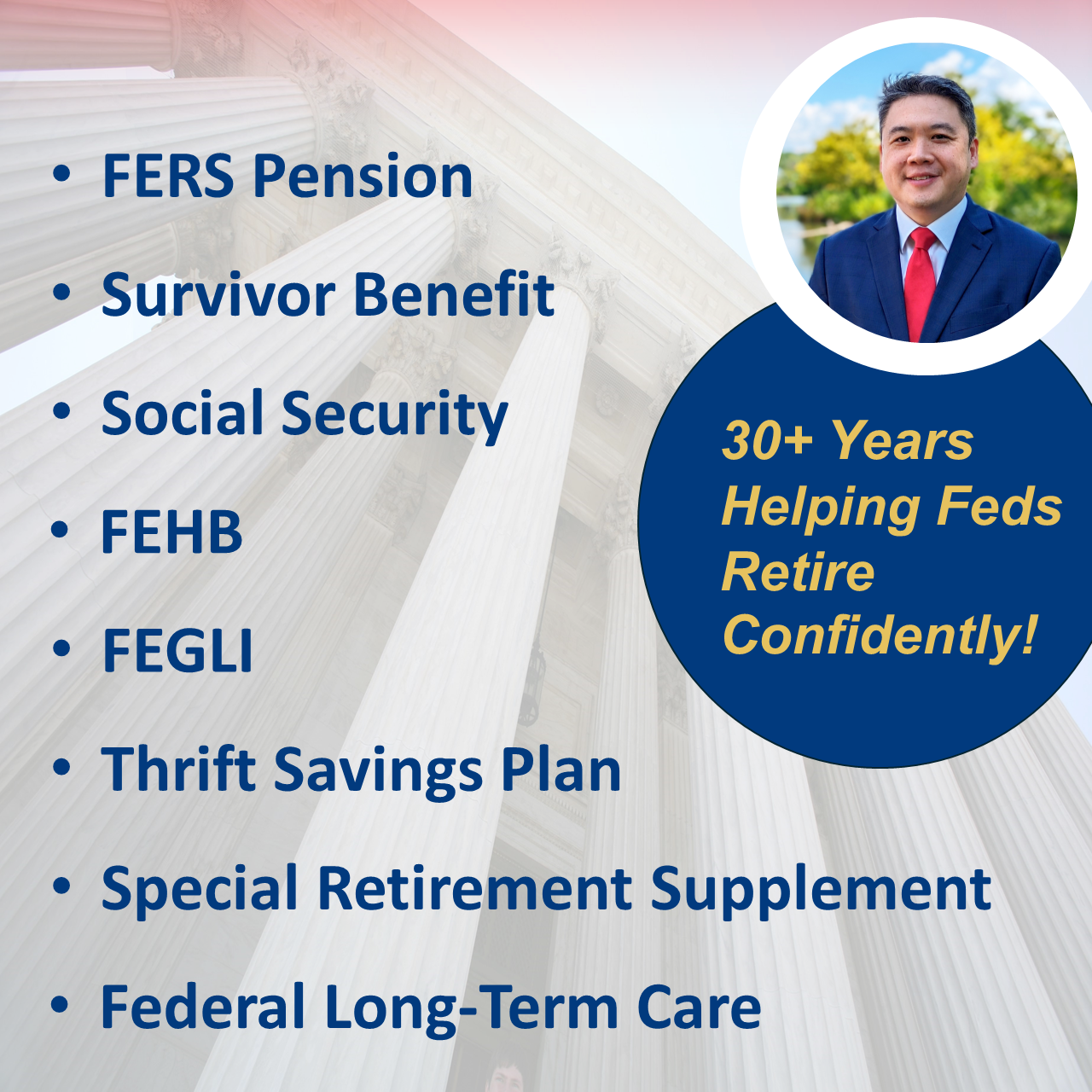Top 5 ways to know you’re ready to retirement from the federal government. Understand the optimal retirement age for federal employees and more! Learn about your FERS pension.
Federal Employee Retirement: Best Age to Retire and Other Tips Before Applying to OPM
Retirement is a significant milestone in the life of any federal employee. Determining the best age to retire from the federal government involves careful consideration of various factors, including financial readiness, personal goals, and the intricacies of the Federal Employees Retirement System (FERS). In this article, we’ll examine key aspects in preparing for your departure from the federal government and making sure you’re ready – then it’ll be time to determine what age is best for you when it comes to retiring under FERS.
Click Here to Download the Free FERS Handbook PDF
Financial Readiness for Federal Retirement
Before deciding to leave your job at federal agency, there are some important factors to consider. The earlier you retire, the more income you will need to sustain a prosperous retirement. Figuring out your cash flow, managing income sources, and choosing to work another job outside of federal employment are critical when government employees are timing their retirement.
Calculating Your FERS Retirement Benefit
Estimating the FERS pension amount involves understanding the high-3 average salary, which is the highest average salary earned over any three consecutive years of service. This figure is used to determine the basic benefit, which is a percentage of the high-three average salary multiplied by the years of creditable service. Federal employees can use a federal retirement calculator to estimate their FERS retirement benefits and plan accordingly for their financial future. Considering age reduction penalties, the 1.1% multiplier for those at least age 62 with at least 20 years of service, and whether you are able to retire immediately can all influence your retirement income.
Understanding the Role of Social Security in FERS
Social security plays a vital role regarding federal benefits for employees under the FERS retirement system. Federal employees who retire are eligible for social security benefits, which supplement their FERS basic benefit and TSP savings. The integration of social security into the FERS retirement plan ensures that federal employees have a diversified source of retirement income, providing additional financial security during retirement. Deciding when to take social security, and the impact this will have on your financial wellbeing, is necessary for federal employees. If retiring before they reach age 62, they might be able to receive the special retirement supplement (SRS) benefit, but like social security, will subject to the earnings test if you take another job. Knowing if claiming social security at age 62, the full retirement age (around age 67), or age 70 is best for your financial circumstances is one area where a financial planner for federal employees can help in the process.
Consulting with a Retirement Planner for Federal Employees
Consulting with a retirement planner can provide valuable insights for federal employees planning their retirement. A retirement planner can help federal workers navigate the complexities of the FERS retirement system, optimize their retirement benefits, and develop a comprehensive investment strategy pertaining to management of their Thrift Savings Plan (TSP). Professional guidance ensures that federal employees avoid costly mistakes and feel confident that they are making informed decisions about their retirement age and financial future.
Schedule a meeting with a Fed-Expert Financial Advisor now.
Evaluating Personal Retirement Goals and Needs
Assessing financial readiness is a critical step in deciding when to retire. Federal employees should evaluate their savings, pension, and social security benefits to determine if they can sustain their desired lifestyle. Deciding when to retire from the federal government requires evaluating personal retirement goals and needs. Federal employees should consider their desired lifestyle, health care needs, and family obligations. A planner that has extensive experience in the federal space can provide invaluable assistance with all of your benefits, including FEHB, FEGLI, and more.
Learn what makes PlanWell Financial Different than Other Firms
Assessing Financial Readiness for Retirement with Holistic Approach
There are several significant areas that federal employees often overlook when gearing up for retirement. Figuring out how to maximize income from the three legs of FERS is vital. But benefits not involving the TSP, FERS annuity, or social security, such as healthcare costs, life insurance, and even long-term care needs, should be understood before you aim to retire as they might impact your post-career goals more than you realize.
FEHB Coverage Post-Retirement: Rising Costs
Along with rising premiums, if FEHB (Federal Employee Health Benefits) coverage is maintained after retiring, it will become even more expensive, not only because healthcare costs rise as we get older, but also because FEHB is paid with post-tax dollars, which is not the case when you are still employed by the government. It is also important to remember the 5-year rule when it comes to FEHB, as coverage cannot be carried into retirement if it wasn’t maintained for the last five years of your employment.
FEGLI Decisions when Applying for Retirement Benefits
The Federal Employee Group Life Insurance (FEGLI) program is a typically a great option for younger feds as the premiums are affordable and, if you enrolled when you were hired, there’s no medical exam required. But around age 55, the premiums start to increase dramatically and this expense continues to grow if full coverage is kept in retirement. A financial planner can help find more affordable alternatives to FEGLI options B and C while Basic coverage and option A insurance can be kept in retirement at no additional cost, however both will be reduced gradually by 75% – but simply dropping all of your FEGLI benefits is often not the wisest decision. Keeping 100% of FEGLI or 25% without paying additional premiums should be your only considerations when planning for retirement.
Long Term Care Insurance Needs in Federal Retirement
The Federal Long Term Care Insurance Program (FLTCIP) is no longer accepting new applications (at least until December 2026), but that doesn’t mean federal workers won’t have to deal with long-term care costs in the future. Whether it’s self-insuring, finding a private policy, or researching annuity or life insurance products with a long-term care component, a fed-expert financial planner will be able to assist.
Learn more about your benefits at a Free Online Federal Retirement Seminar!
Timing Your Exit: The Application Process
As a federal employee’s retirement date approaches, they should have a grasp of their post-career financial situation and income sources and be filling out their application for OPM. An agency’s HR department is responsible for verifying information on that application and approving it. If you are applying for an immediate CSRS (Civil Service Retirement System) or FERS annuity, you can submit it to the human resources manager up to 31 days after your retirement date. After that month has passed, it must be submitted directly to the Office of Personnel Management (OPM) and this can lengthen the time it takes the application to be processed. If you are deferring or postponing your FERS pension, it is advisable to submit the application (RI 92-19) roughly 60 days prior to leaving federal service.
Military Deposits and Redeposits
Also before submitting your application to OPM, don’t miss out on extra income by forgetting about prior creditable federal service (such as the Peace Corps or a seasonal USPS job). With a redeposit, you can add this service to your FERS calculation and boost your annuity throughout retirement. If you served in the military before your civilian career with the government, a military deposit is often a wise decision as well. This involves foregoing US Military retirement pay to add that service to your pension. A financial advisor with extensive experience working with federal employees can help to figure out if this deposit is it worth it in the long run.
Annual and Sick Leave Management
When preparing to retire from public service, don’t forget about unused annual and sick leave. Annual leave is paid out as a taxable lump sum as soon as you retirement date hits. Because only 240 hours can be carried over year-to-year, many in the federal workforce feel the last day of the year is the best time to retire. Sick leave is different, the unused accrued hours are converted into service when calculating the federal pension benefits. While this additional time doesn’t contribute to one’s eligibility for retiring, it can help in crossing the 20-year threshold needed to receive the 1.1 percent multiplier for those who retire at age 62 or later.
How to Decide When to Retire from the Federal Government: What is the Best Age for Federal Employees to Retire?
Understanding the Minimum Retirement Age for Federal Employees
The minimum retirement age (MRA) for federal employees is a crucial factor in deciding when to retire. The MRA varies depending on the year of birth, typically ranging from age 55 to age 57. Federal employees can retire at their MRA with at least 30 years of service or at age 60 with at least 20 years of service. Understanding these age and service requirements is essential for federal employees to retire with full benefits. This is different from the mandatory retirement age for special category employees who are subject to mandatory retirement at age 56 or 57, and they are also eligible to retire at any age with at least 25 years as a special provisions employee.
Factors Influencing the Best Age to Retire from Federal Service
Several factors influence the best age to retire from federal service. These include financial considerations, health status, personal goals, and family responsibilities. The decision to retire at age 62, for instance, allows federal employees to maximize their FERS retirement benefits and social security benefits. However, some may choose to retire earlier or later based on their unique circumstances. Evaluating these factors helps federal employees make informed decisions about their retirement age. Retirement at your MRA with 30 years of service can still mean giving up considerable retirement income as you will need to access TSP savings sooner, will likely have a smaller high-3, and waiting to 62 would provide the 1.1% multiplier to the FERS annuity, which equates to a 10% boost. This is why speaking with a fed-expert financial planner is important before retiring as soon as you meet the age and service requirements.
Comparing Retirement Ages: Age 60 vs. Age 62
Comparing retirement at age 60 versus age 62 is a common consideration for federal employees. Retiring at age 60 with at least 20 years, but less than 30 years, of service provides immediate retirement eligibility, but waiting until age 62 can increase the retirement benefit due to the absence of early withdrawal penalties (pension is reduced by 5 percent permanently for each year under 62), and the potential for a higher high-3 average salary. Additionally, retiring at age 62 allows federal employees to begin receiving social security benefits, further enhancing their retirement income, and with at least 20 years of service, they receive a 10% pension boost as well.
What are the Benefits of Early Retirement for Federal Employees?
The term “early retirement” can mean many things when it comes to federal employment. Not counting a medical or disability retirement or those who retire under special provisions (such as air-traffic controllers), there are “early out” offers through VERA (Voluntary Early Retirement Authority), discontinued service benefits for federal workers who lost their job involuntarily (DSR), and also postponed as well as deferred retirement options. Each “early retirement” has different retirement rules, but for VERA or DSR, the eligibility criteria is identical: age 50 with 20 years of service or more, or any age with at least 25 years. Generally speaking, deferring retirement is possible if you are younger than your MRA and have at least 5 years of service. A postponed retirement is if you are at your MRA and have at least 10 years of service.
Pros and Cons of Early Retirement from Federal Service
Early retirement can significantly impact retirement income. Federal employees who retire early may receive a lower pension due to the reduced number of service years and the early withdrawal penalty. Additionally, they may need to rely more heavily on their TSP and other retirement accounts to maintain their desired lifestyle. Careful financial planning is essential to mitigate the impact of early retirement on retirement income. This why the optimal retirement age for feds is often personal and dependent on how much the individual enjoys their occupation.
Reach Out to Us!
If you have additional federal benefit questions, contact our team of CERTIFIED FINANCIAL PLANNER™ (CFP®), Chartered Federal Employee Benefits Consultants (ChFEBC℠), and Accredited Investment Fiduciaries (AIF®). At PlanWell, we are federal employee financial advisors with a focus on retirement planning. Learn more about our process designed for the career fed.
Preparing for federal retirement? Check out our scheduled federal retirement workshops. Sign up for our no-cost federal retirement webinars through our online workshop page. Make sure to plan ahead and reserve your seat for our FERS webinar, held every three weeks. Want to have PlanWell host a federal retirement seminar for your agency? Reach out, and we’ll collaborate with HR to arrange an on-site FERS seminar.
Want to fast-track your federal retirement plan? Skip the FERS webinar and schedule a one-on-one meeting with a ChFEBC℠ today.










